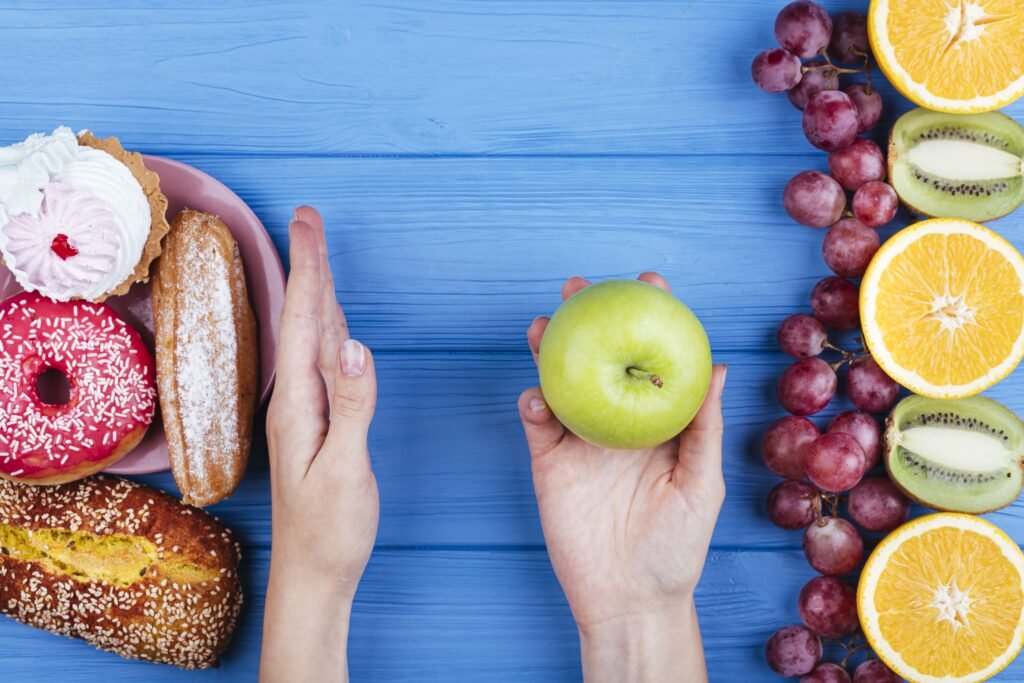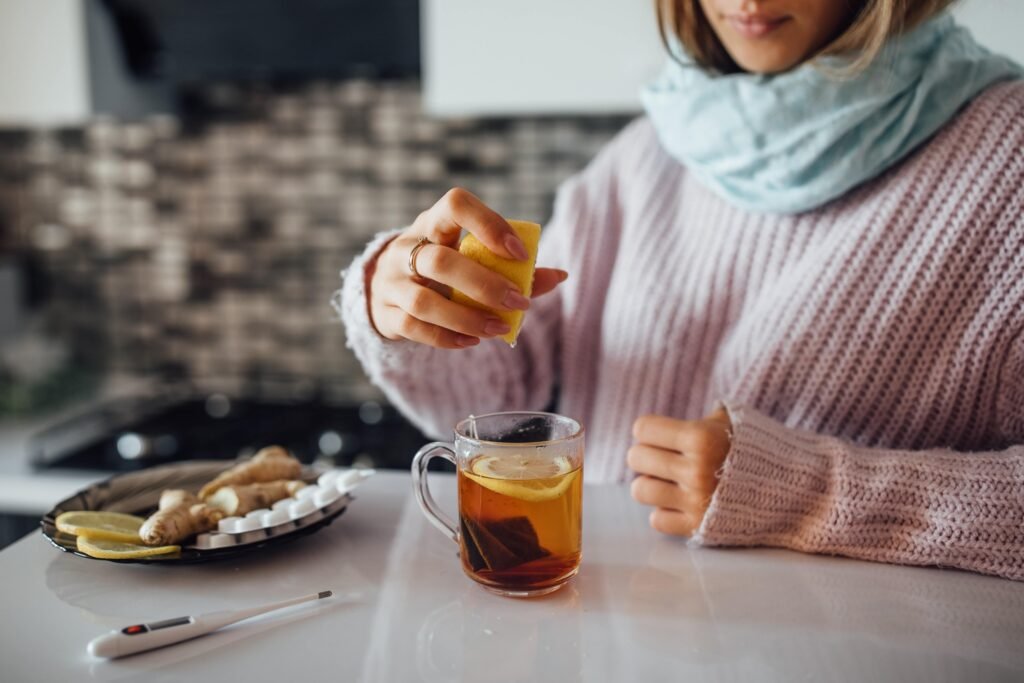If you’re like me, sugar cravings feel like a never-ending challenge. But what if I told you that those cravings aren’t just about willpower or habit — they’re deeply connected to your gut health? I used to think sugar was just a harmless indulgence, but after years of digestive discomfort and fatigue, I realized that my cravings were actually a symptom of an imbalanced gut.
The gut is often called the “second brain” because it controls so much of your wellbeing — digestion, immunity, even mood. When sugar feeds the wrong bacteria in your gut, it throws this delicate balance off and makes you crave even more sugar. The cycle can feel impossible to break.
But the truth is, you can curb sugar cravings naturally by nurturing your gut. Over time, I discovered easy, effective habits and foods that helped me reclaim control, improve my digestion, and finally feel energized without the sugar rollercoaster.
In this post, I’ll share everything I’ve learned — scientifically backed, gut-focused, and delivered in a simple, personal way — so you can stop battling cravings and start feeling better from the inside out.
Table of Contents
Understanding Sugar Cravings and Their Impact on Gut Health

Why Do We Crave Sugar?
Sugar cravings don’t just happen randomly. There are several key reasons behind them:
- Gut bacteria imbalance: Your gut is home to trillions of bacteria — both good and bad. Unfortunately, some bad bacteria and yeast like Candida thrive on sugar. When these microbes grow out of balance, they send signals to your brain that make you crave more sugar to feed them.
- Blood sugar fluctuations: Eating sugar causes your blood glucose to spike quickly, giving a brief energy boost. But this is followed by a steep crash that triggers hunger and cravings for more sugar — fueling a vicious cycle.
- Emotional triggers: Stress, anxiety, and even boredom can push you toward sugary comfort foods because sugar temporarily raises feel-good brain chemicals like dopamine.
- Habits and environment: Routine habits like having dessert after meals or snacking while watching TV condition your brain to expect sugar regularly.
The Gut-Brain Axis: How Your Gut Talks to Your Brain
The gut and brain are in constant communication through what’s called the gut-brain axis. Your gut microbes produce chemicals that influence your mood, appetite, and cravings. When the balance of your microbiome is off, your gut bacteria can actually “hijack” your cravings to favor sugar — the food they love.
This explains why sometimes cravings feel overwhelming or uncontrollable. They are not just “in your head” — they’re biological signals rooted in your gut.
How Excess Sugar Harms Your Gut
Eating too much sugar does more than feed bad bacteria:
- Promotes overgrowth of harmful bacteria and yeast: This causes digestive symptoms like bloating, gas, and discomfort.
- Contributes to leaky gut: Excess sugar weakens the intestinal lining, allowing toxins to enter your bloodstream and triggering inflammation.
- Reduces gut microbiome diversity: A less diverse microbiome is linked to poorer digestion, immune issues, and mood disorders.
- Impairs nutrient absorption: Excess sugar damages your gut lining, reducing your ability to absorb essential nutrients.
This gut damage can cause fatigue, cravings, and even weight gain — creating a cycle that’s hard to escape.
How to Curb Sugar Cravings Naturally: Gut-Friendly Tips That Work

Now that you understand why cravings happen and how they harm your gut, here are natural, gut-friendly strategies that helped me and many others break free from sugar’s grip.
1. Hydrate Well — Drink Plenty of Water
Often, what feels like a sugar craving is mild dehydration in disguise. Drinking water regularly helps flush out toxins, supports digestion, and keeps your gut lining healthy.
Try this: When a craving hits, drink a full glass of water and wait 10 minutes. You might find the craving fades naturally.
Adding a splash of lemon or apple cider vinegar to your water can improve digestion and help stabilize blood sugar.
2. Prioritize Protein at Every Meal
Protein stabilizes your blood sugar and keeps you feeling full longer — two keys to reducing sugar cravings. It also supports gut lining repair and immune function.
Incorporate sources like:
- Eggs
- Grass-fed chicken or turkey
- Wild-caught fish
- Lentils and beans
- Nuts and seeds
Including protein with every meal helped me stop the mid-afternoon sugar binges and feel energized.
3. Load Up on Fiber-Rich Foods
Fiber feeds your good gut bacteria and slows sugar absorption to prevent blood sugar spikes and crashes.
Try eating:
- Leafy greens (spinach, kale, arugula)
- Cruciferous veggies (broccoli, cauliflower)
- Berries (blueberries, raspberries)
- Legumes (lentils, chickpeas)
- Whole grains (oats, quinoa)
Starting my day with fiber-rich oatmeal or smoothies kept me full and reduced cravings throughout the day.
4. Embrace Healthy Fats
Healthy fats balance hormones that regulate hunger and cravings and reduce gut inflammation.
Include:
- Avocados
- Extra virgin olive oil
- Nuts and seeds (walnuts, almonds, chia seeds)
- Fatty fish (salmon, mackerel)
Adding these fats helped me stay satisfied and cut down on sugary snacks.
5. Manage Stress with Mindfulness and Movement
Stress increases cortisol, a hormone that ramps up sugar cravings and disrupts digestion.
Daily mindfulness practices like deep breathing or meditation helped calm my nervous system and reduce emotional cravings.
Gentle exercise, such as walking or yoga, also lowers stress and supports gut health.
Try pairing a short walk with mindful breathing after meals for best results.
6. Get Quality Sleep
Poor sleep disrupts hunger hormones ghrelin and leptin, causing increased cravings for sugar and carbs.
Improving sleep hygiene — consistent sleep schedule, avoiding screens before bed, and relaxing routines — drastically reduced my cravings.
Aim for 7–9 hours of restful sleep nightly.
7. Use Natural Sweeteners Wisely
When you want sweetness, opt for gut-friendly natural sweeteners that don’t feed harmful bacteria:
- Stevia
- Monk fruit
- Small amounts of raw honey or maple syrup (use sparingly)
Avoid artificial sweeteners as they may harm your gut microbiome.
8. Spice It Up with Cinnamon, Ginger, and Turmeric
These spices help regulate blood sugar and support gut health:
- Cinnamon slows sugar absorption.
- Ginger soothes digestion.
- Turmeric fights inflammation.
Add cinnamon to oatmeal or smoothies, sip ginger tea, or include turmeric in meals.
9. Practice Mindful Eating
Slow down and savor each bite. Mindful eating helps you recognize real hunger cues instead of eating out of boredom or emotion.
Put away distractions during meals and focus on the flavors and textures.
10. Plan Balanced Meals and Snacks
Having planned meals with protein, fiber, and healthy fats keeps blood sugar steady and cravings low.
Keep easy snacks on hand like nuts with berries or Greek yogurt with chia seeds.
Foods That Reduce Sugar Cravings and Boost Gut Health

Certain foods not only satisfy your taste buds but also help reduce sugar cravings and nourish your gut.
Nuts and Seeds
Rich in fiber, protein, and healthy fats, nuts and seeds keep you full and stabilize blood sugar. Almonds, walnuts, chia seeds, and flaxseeds are excellent choices.
Fresh Fruits
Fruits like berries and apples offer natural sweetness along with fiber and antioxidants, making them a perfect alternative to processed sweets.
Dark Chocolate
In moderation, dark chocolate (70% cacao or higher) can satisfy sweet cravings without spiking blood sugar. Plus, it contains antioxidants that support gut health.
Yogurt and Probiotics
Fermented foods like yogurt, kefir, sauerkraut, and kimchi introduce beneficial bacteria to your gut, helping restore balance and reduce sugar cravings.
Whole Grains
Whole grains like oats, quinoa, and brown rice provide slow-release carbs that help maintain steady blood sugar levels.
Lifestyle Changes for Long-Term Success
Changing your relationship with sugar isn’t just about quick fixes or temporary willpower — it’s about creating lasting lifestyle shifts that support your gut health and overall wellbeing. When I first started my journey, I realized that understanding the why behind cravings helped me make better choices, but the real game-changer was making intentional, consistent changes that became second nature.
Here are some essential lifestyle strategies that helped me maintain long-term success and can help you too:
1. Plan Your Meals Ahead to Prevent Blood Sugar Dips
One of the biggest triggers for sugar cravings is letting your blood sugar dip too low. Skipping meals or eating unbalanced meals (like just carbs without protein or fat) can cause those dreaded energy crashes and intense sugar urges.
By planning your meals and snacks ahead of time, you ensure you’re fueling your body consistently with gut-friendly, nutrient-dense foods. When I started prepping simple meals in advance, I found myself reaching for sugary snacks way less often because I wasn’t running on empty.
Tip: Keep quick, balanced snacks handy—like nuts, Greek yogurt, or chopped veggies with hummus—to avoid grabbing sugary convenience foods when hunger strikes.
2. Identify and Address Your Personal Triggers
Sugar cravings often have an emotional or situational root. Maybe you crave sweets when you’re stressed, tired, bored, or even during social events.
For me, stress was a huge trigger. Once I started noticing when and why I craved sugar, I could take proactive steps to manage those situations better. Sometimes that meant going for a walk, calling a friend, or practicing deep breathing instead of reaching for a chocolate bar.
Try keeping a cravings journal for a week. Write down:
- When the craving hit
- What you were feeling emotionally
- What you were doing
- What you ate or drank before
This helps you see patterns and plan healthier coping strategies.
3. Celebrate Small Wins to Build Motivation
Breaking sugar cravings can feel overwhelming, especially if you’re used to daily sweets. Instead of beating yourself up for occasional slip-ups, celebrate your progress.
Every time you choose a gut-friendly snack over sugar, or resist a craving, it’s a win worth acknowledging. This positive reinforcement builds momentum and makes lasting change easier.
I found that rewarding myself with non-food treats—like a massage, a good book, or a relaxing bath—helped me stay motivated without turning back to sugar.
4. Develop a Support System
Changing habits is easier when you’re not doing it alone. Sharing your goals with friends, family, or support groups creates accountability and encouragement.
I joined an online gut health community where people shared tips, successes, and struggles. Having that connection made me feel understood and kept me motivated on tough days.
If you can, find a buddy who wants to make healthier choices too, so you can encourage each other.
5. Prioritize Self-Care and Stress Management
Chronic stress sabotages gut health and drives sugar cravings by releasing cortisol, the stress hormone that increases appetite.
Integrating self-care practices into your daily routine—like meditation, journaling, gentle movement, or even just quiet time—helps calm your nervous system and reduces emotional eating.
For me, just 5 minutes of morning mindfulness set a peaceful tone for the day and lowered my cravings significantly.
By embracing these lifestyle changes, you build a strong foundation that supports your gut microbiome, stabilizes your blood sugar, and reduces those persistent sugar cravings naturally. Over time, these shifts become your new normal — one where you feel energized, balanced, and in control.
Natural Home Remedies for Sugar Cravings and Gut Health

Try these when cravings hit:
- Herbal teas (peppermint, chamomile)
- Apple cider vinegar diluted in water before meals
- Lemon water for detox and refreshment
- Inhaling essential oils like lavender to reduce stress
Conclusion
Curbing sugar cravings naturally—especially with a gut health focus—is totally possible. It’s about nurturing your microbiome, balancing blood sugar, managing stress, and practicing mindful eating.
I’ve been there. With patience and the right strategies, you can break free from cravings and enjoy vibrant health from the inside out.
Remember: every small positive step nourishes your gut and helps silence those cravings. Here’s to a happier, healthier you!
Frequently Asked Questions (FAQs)
1. What deficiency causes sugar cravings?
Sugar cravings can be linked to deficiencies in magnesium, chromium, zinc, or B-vitamins. These nutrients help regulate blood sugar levels and support healthy metabolism. When your body lacks them, it may send signals that mimic sugar cravings.
Tip: Include more leafy greens, nuts, seeds, and whole grains in your diet to naturally restore balance.
2. Can probiotics reduce sugar cravings?
Yes! Taking gut health probiotics can help rebalance your microbiome, especially if bad bacteria or yeast like Candida are overgrown. These microbes feed on sugar and may influence cravings. Probiotics support the growth of good bacteria, which helps curb cravings naturally over time.
Look for strains like Lactobacillus rhamnoses and Bifidobacterium lactis — both are studied for their impact on gut-brain communication.
3. What is the best supplement to stop sugar cravings?
Natural supplements that may reduce sugar cravings include:
- L-glutamine – helps fuel your brain and reduces sugar and carb cravings.
- Magnesium – often depleted in people with strong sugar cravings.
- Chromium picolinate – supports stable blood sugar levels.
- Probiotics – improve gut balance and reduce sugar-seeking microbes.
Always consult with your healthcare provider before starting new supplements.
4. How can I detox from sugar fast?
To detox from sugar naturally:
- Eat protein and healthy fats at each meal to stay full
- Stay hydrated (add lemon or apple cider vinegar to water)
- Get enough sleep
- Use cinnamon and chromium to support blood sugar
- Eat probiotic and fiber-rich foods for gut health
Bonus Tip: Avoid artificial sweeteners during detox, as they may trigger cravings and harm gut bacteria.
5. Why do I crave sugar after eating?
Craving sugar after meals often happens due to:
- Unbalanced meals (too many carbs, not enough protein or fat)
- Gut dysbiosis – bad bacteria feed on sugar and signal your brain
- Habitual dessert eating
- Blood sugar spikes and crashes
Fix this by eating more balanced meals and introducing fermented foods or probiotics to support your gut.
6. Is craving sugar a sign of Candida overgrowth?
Yes, strong sugar cravings can be a symptom of Candida overgrowth — a common yeast imbalance in the gut. Candida thrives on sugar and sends signals through the gut-brain axis to urge you to eat more of it.
If you also experience bloating, brain fog, or fatigue, it may be worth exploring a gut-healing or anti-Candida protocol.
